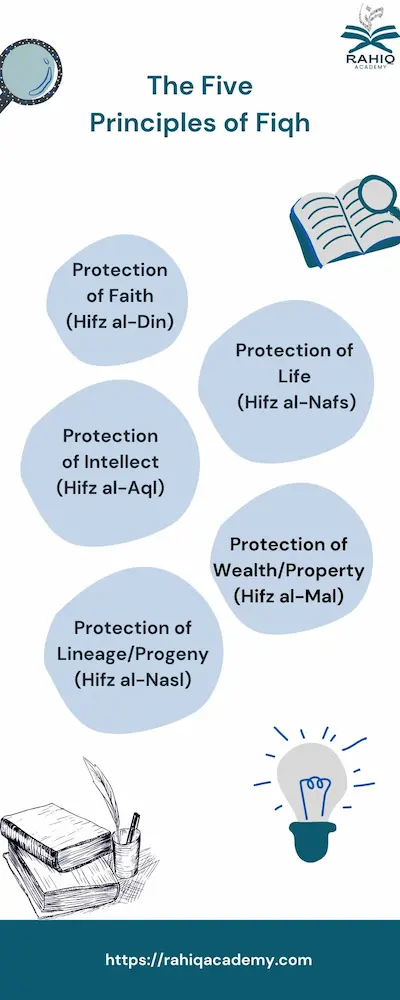Islamic jurisprudence, known as Fiqh, is a cornerstone of Islamic studies, providing guidance for Muslims in their daily lives and spiritual practices. This article define Fiqh and delves into the intricacies, exploring schools of thought and fundamental principles. Whether you’re a beginner seeking to understand the basics or an advanced student looking to deepen your knowledge, this comprehensive guide will illuminate the rich tapestry of Islamic legal thought
Understanding akhlaq and fiqh definitions
Fiqh Definition
Fiqh, derived from the Arabic word “فقه “meaning “deep understanding” or “full comprehension,” refers to Islamic jurisprudence. It is the human interpretation and application of Islamic law (Sharia) based on the Quran and the Sunnah. Allah says in the Quran:
وَمَا كَانَ الْمُؤْمِنُونَ لِيَنفِرُوا كَافَّةً ۚ فَلَوْلَا نَفَرَ مِن كُلِّ فِرْقَةٍ مِّنْهُمْ طَائِفَةٌ لِّيَتَفَقَّهُوا فِي الدِّينِ وَلِيُنذِرُوا قَوْمَهُمْ إِذَا رَجَعُوا إِلَيْهِمْ لَعَلَّهُمْ يَحْذَرُونَ
“And it is not for the believers to go forth [to battle] all at once. For there should separate from every division of them a group [remaining] to obtain understanding in the religion and warn their people when they return to them that they might be cautious.” (Quran 9:122)
This verse emphasizes the importance of seeking deep understanding (tafaqquh) in religion, which is the essence of Fiqh.
Akhlaq Definition
Akhlaq, often translated as “ethics” or “moral character,” refers to the system of Islamic morality and ethical behavior. The Prophet Muhammad (peace be upon him) said:
إِنَّمَا بُعِثْتُ لِأُتَمِّمَ مَكَارِمَ الْأَخْلَاقِ
“I have been sent to perfect good character.” (Reported by Ahmad)
This Hadith underscores the centrality of Akhlaq in Islamic teachings, highlighting its importance alongside Fiqh in shaping a Muslim’s life.
The Four Schools of Fiqh in Sunni Islam

Sunni Islam recognizes four major schools of Islamic jurisprudence, each named after its founding scholar:
- Hanafi School: Founded by Imam Abu Hanifa (699-767 CE)
- Maliki School: Founded by Imam Malik ibn Anas (711-795 CE)
- Shafi’i School: Founded by Imam Muhammad ibn Idris al-Shafi’i (767-820 CE)
- Hanbali School: Founded by Imam Ahmad ibn Hanbal (780-855 CE)
The Four Schools of Fiqh in Sunni Islam developed distinct methodologies for deriving Islamic rulings, while agreeing on fundamental principles. The Quran acknowledges differences of opinion:
وَلَوْ شَاءَ رَبُّكَ لَجَعَلَ النَّاسَ أُمَّةً وَاحِدَةً ۖ وَلَا يَزَالُونَ مُخْتَلِفِينَ
“And if your Lord had willed, He could have made mankind one community; but they will not cease to differ.” (Quran 11:118)
5 principles of fiqh (Maqasid al-Shariah)

Islamic jurisprudence is guided by 5 principles of fiqh known as the Maqasid al-Shariah:
- Protection of Faith (Hifz al-Din)
- Protection of Life (Hifz al-Nafs)
- Protection of Intellect (Hifz al-Aql)
- Protection of Lineage/Progeny (Hifz al-Nasl)
- Protection of Wealth/Property (Hifz al-Mal)
These principles ensure that Islamic law fulfills its purpose of protecting and promoting human welfare. The Quran states:
وَمَا أَرْسَلْنَاكَ إِلَّا رَحْمَةً لِّلْعَالَمِينَ
“And We have not sent you, [O Muhammad], except as a mercy to the worlds.” (Quran 21:107)
This verse emphasizes the overarching goal of Islamic law to bring mercy and benefit to all of creation.
5 Kaidah Ushul Fiqh
The five fundamental maxims of Islamic jurisprudence, known as Al-Qawa’id Al-Fiqhiyyah Al-Kubra, provide guidelines for deriving legal rulings:
- Al-Umuru Bi Maqasidiha (الأمور بمقاصدها) – “Actions are judged by their intentions”
- Al-Yaqinu La Yazulu Bi Ash-Shakk (اليقين لا يزول بالشك) – “Certainty is not overruled by doubt”
- Al-Mashaqqatu Tajlibu At-Taysir (المشقة تجلب التيسير) – “Hardship begets facility”
- Ad-Dararu Yuzal (الضرر يزال) – “Harm must be eliminated”
- Al-‘Adatu Muhakkamah (العادة محكمة) – “Custom is a basis of judgment”
These principles are derived from various Quranic verses and Hadiths, such as:
إِنَّمَا الْأَعْمَالُ بِالنِّيَّاتِ
“Actions are but by intentions.” (Sahih al-Bukhari)
This Hadith forms the basis of the first principle, emphasizing the importance of intention in Islamic law.
FAQ
A:What is the Study of Fiqh?
Q:Fiqh is the study of Islamic jurisprudence, which provides practical guidance on how Muslims apply Islamic teachings in everyday life.
A:What Are the 4 Types of Fiqh?
Q:Fiqh is commonly divided into four main types:
- Ibadat (Acts of Worship)
- Mu’amalat (Transactions and Contracts):
- Munakahat (Family Law)
- Jinayat (Criminal Law)
A:What Are the 5 Levels of Fiqh?
Q:In Fiqh, actions are classified into five levels to help Muslims understand the importance of each action:
- Fard (Obligatory)
- Mustahabb (Recommended)
- Mubah (Permissible)
- Makruh (Discouraged)
- Haram (Prohibited)
Conclusion
Understanding Islamic jurisprudence is crucial for every Muslim seeking to live their life in accordance with Islamic principles. The study of Fiqh, its schools of thought, and its fundamental principles provides a framework for applying Islamic teachings to various aspects of life, from personal worship to social interactions and ethical conduct.
As we navigate the complexities of the modern world, a deep understanding of Fiqh and its principles becomes ever more important. It allows us to address contemporary issues while remaining true to the core values of Islam.
For those looking to deepen their knowledge of Islamic jurisprudence and other Islamic sciences, RAHIQ Academy offers comprehensive courses taught by qualified scholars. These courses provide a structured approach to learning, helping students develop a nuanced understanding of Islamic law and its application in today’s world.
Remember, the pursuit of knowledge is a lifelong journey in Islam. As the Prophet Muhammad (peace be upon him) said:
مَنْ سَلَكَ طَرِيقًا يَلْتَمِسُ فِيهِ عِلْمًا سَهَّلَ اللهُ لَهُ بِهِ طَرِيقًا إِلَى الْجَنَّةِ
“Whoever takes a path upon which to obtain knowledge, Allah makes the path to Paradise easy for him.” (Sahih Muslim)
May this guide serve as a stepping stone on your path to deeper understanding and closer proximity to Allah.




